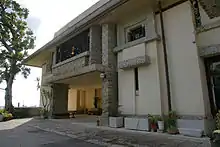Ashiya, Hyōgo
Ashiya (芦屋市, Ashiya-shi) is a city in Hyōgo Prefecture, Japan, between the cities of Nishinomiya and Kobe. The city was founded on November 10, 1940.
Ashiya
芦屋市 | |||||||||||
|---|---|---|---|---|---|---|---|---|---|---|---|
 Clockwise from top, Ashiya River, Ashiya Municipal Museum Art, Yodoko Guest House, Emba Museum of Modern Art, Ashiya Citizen Center, Bell Port Ashiya, Jyunichiro Tanizaki Memorial Hall | |||||||||||
 Flag  Emblem | |||||||||||
 Location of Ashiya in Hyōgo Prefecture | |||||||||||
 Ashiya Location in Japan | |||||||||||
| Coordinates: 34°43′40″N 135°18′12″E | |||||||||||
| Country | Japan | ||||||||||
| Region | Kansai | ||||||||||
| Prefecture | Hyōgo Prefecture | ||||||||||
| Government | |||||||||||
| • Mayor | Ken Yamanaka | ||||||||||
| Area | |||||||||||
| • Total | 18.47 km2 (7.13 sq mi) | ||||||||||
| Population (April 1, 2017) | |||||||||||
| • Total | 94,474 | ||||||||||
| • Density | 5,100/km2 (13,000/sq mi) | ||||||||||
| Time zone | UTC+09:00 (JST) | ||||||||||
| City hall address | 7-6 Seidōchō, Ashiya-shi, Hyōgo-ken 659-8501 | ||||||||||
| Website | www | ||||||||||
| |||||||||||
As of 1 April 2017, the city has an estimated population of 94,474.

History
Ashiya was established in 1871 as a township in Hyōgo Prefecture. In the early 1900s, it was designated as an urban planning area. This led to the building of large single-family homes with tennis courts, swimming pools, and tea houses, etc. along the hills overlooking Osaka Bay.
In 1945, the City of Ashiya prohibited the operation of pachinko parlors, gambling and entertainment facilities as well as small factories. Those laws still stand and there is no other municipal government with similar regulations in Japan.
In 1991, Ashiya residents elected Harue Kitamura as the first woman to hold the office of mayor of a city in Japan. Kitamura was mayor when Ashiya suffered major damage during the Kobe earthquake on January 17, 1995.
Neighboring municipalities
- Hyōgo Prefecture
Culture and people
Persons of note associated with Ashiya include Jirō Shirasu ("the man who reproached MacArthur"), Ryōji Noyori (Nobel prize winner), Takashi Asahina (conductor), Junichirō Tanizaki (writer), Haruki Murakami (writer), Yuriko Koike (House of Representatives member), Yōko Ogawa (writer), Tsumasaburō Bandō (kabuki actor), Morinosuke Kawaguchi (futurist), Tsuruko Yamazaki (artist),[1] Takuya Kuroda (jazz trumpeter and arranger) and professional sumo wrestler Takakeishō Mitsunobu.
The city is the main setting in Jun'ichiro Tanizaki's novel Sasameyuki (細雪) (The Makioka Sisters, Eng. trans. Edward G. Seidensticker).

A house designed by Frank Lloyd Wright sits on a hill overlooking Hankyu Ashiyagawa Station and Osaka Bay. It was completed in 1924 as a residence for the Yamamura family, founders of the famous sake company "Sakuramasamune" (櫻正宗). It is now known as the Yodokō Guest House and is open for tours. Ashiya also features the house of Hiroko Koshino designed by Pritzker Architecture Prize winner Tadao Ando.
Transport
The first railway line to the city was completed in 1905.[2]
Central Ashiya is served by JR West Ashiya Station. Hanshin Electric Railway Ashiya Station and Uchide Station serve the southern part of the city, while Hankyu Railway Ashiyagawa Station is located in the quieter northern area.
Sister city
A sister city agreement was signed between Ashiya and Montebello, California on May 24, 1961. Student Ambassadors are chosen to travel to Montebello every year since 1964.[3]
References
- "Tsuruko Yamazaki (1925–2019)". www.artforum.com. Retrieved 2020-01-08.
- "Ashiya" in The New Encyclopædia Britannica. Chicago: Encyclopædia Britannica Inc., 15th edn., 1992, Vol. 1, p. 626.
- "Montebello, California". Ashiya City. Archived from the original on August 19, 2014. Retrieved August 11, 2013.
External links
| Wikimedia Commons has media related to Ashiya, Hyogo. |
- Official website
 (in Japanese)
(in Japanese) - Ashiya-People.com Local media website (in Japanese)